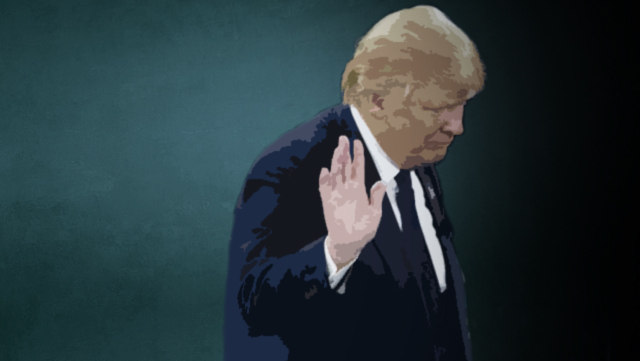Nathan Gardels is the editor-in-chief of Noema Magazine. He is also the co-founder of and a senior adviser to the Berggruen Institute.
Events this week on opposite sides of the planet offered a glimpse of what a post-American world might look like. In Bonn, Germany, nations of the world gathered together at a summit to chart the path ahead on fighting climate change through implementing the Paris accord, which U.S. President Donald Trump has rejected. At the APEC meeting in Danang, Vietnam, 11 Pacific Basin countries, led by Japan, decided to push ahead on a multilateral trade agreement that would substitute for the Trans-Pacific Partnership that the Trump administration has pulled out of.
A year into his presidency, Trump and his “America first” policies at home have yet to yield any significant benefits for the “left behind” he championed during his election campaign. Abroad, it appears that it is America itself that is being left behind.
“During President Donald Trump’s first official Asia tour,” Richard Javad Heydarian writes from Manila, “the precipitous erosion of America’s decades-long hegemony in the region has been painfully apparent.” Heydarian notes how the U.S. presence in Asia is becoming critically unbalanced. “While America continues to maintain a significant military edge over its closest rivals, it’s gradually losing the main battle that is defining this century: trade and investment,” he says. “Meanwhile, China is busy shaping the world in its own image with verve and vigor. In a surreal twist of events, a communist regime has now emerged as the unlikely guardian of globalization and multilateral diplomacy.”
Evaluating Trump’s 12-day Asia tour, former Australian Prime Minster Kevin Rudd also sees that America’s retreat means that other nations will set the agenda. “The U.S. has ceded regional economic leadership separately to China and Japan for the foreseeable future at least,” he writes. Inevitably, the economic fate of the region bleeds over into security issues. “There is also the question of how to manage the danger of a broader bifurcation of the region between Chinese and American spheres of influence,” Rudd warns. “Such a process is inherently destabilizing. Indeed, regional governments are feeling the pressure to choose.”
Rudd’s concern brings to mind a wise adage from Singapore’s former foreign minister George Yeo: “While Asian countries might value the U.S. as a friend, no one wants China as an enemy.” Rudd’s advice for escaping this dilemma is “to form a more resilient regional security architecture that escapes brittle, binary strategic choices.”
On this score, the incipient “Indo-Pacific” strategy trotted out by Trump on his tour is moving in the opposite direction. As Gurpreet S. Khurana writes from New Delhi, “‘Indo-Pacific,’ as Trump uses it, implies a new configuration in which India and America, along with the other major democratic nations in Asia — Japan and Australia especially — join to contain China’s growing influence in an updated version of the Cold War.”
A captain in the Indian Navy and a maritime strategist, Khurana is credited with first using the term “Indo-Pacific” in a 2007 essay. Since both China and Japan get around 80 percent of their oil supplies through the Malacca Strait, he argues, the Indian Ocean area and the western Pacific should be considered one integrated region. And, as both the Indian and Chinese economies are among the fastest-growing in the world, tighter links between South and East Asia will inexorably develop.
But Trump’s twist of the concept, says Khurana, “departs significantly from its original meaning and intent. My intention was to re-conceptualize how Asian nations are actually linked together from the Indian Ocean to the Pacific, and I wanted to emphasize the overarching goal of preserving global and regional stability through commercial and strategic maritime cooperation. It was not meant as the opposite — a geopolitical framework that divides Asia into friends and enemies.”
He concludes: “The aim ought to be building common prosperity in these linked regions. Otherwise, the region will become yet another theater of the ‘Thucydides Trap,’ in which rising and established powers fight to impose their dominance.”
This was produced by The WorldPost, a partnership of the Berggruen Institute and The Washington Post.
ADVISORY COUNCIL: Jacques Attali, Shaukat Aziz, Gordon Brown, Fernando Henrique Cardoso, Jack Dorsey, Mohamed El-Erian, Francis Fukuyama, Felipe Gonzalez, John Gray, Reid Hoffman, Fred Hu, Mo Ibrahim, Alexei Kudrin, Pascal Lamy, Kishore Mahbubani, Alain Minc, Dambisa Moyo, Laura Tyson, Elon Musk, Raghuram Rajan, Nouriel Roubini, Nicolas Sarkozy, Gerhard Schroeder, Peter Schwartz, Amartya Sen, Jeff Skoll, Michael Spence, Joe Stiglitz, Larry Summers, George Yeo, Fareed Zakaria, Ernesto Zedillo, Zheng Bijian, Marek Belka, Tony Blair, Jacques Delors, Niall Ferguson, Anthony Giddens, Otmar Issing, Mario Monti, Robert Mundell, Peter Sutherland, Guy Verhofstadt, James Cameron





